 “Shri Rama personally gave liberation to Shabari, the vulture Jatayu and those who performed wonderful devotional service, whereas the holy name has liberated countless wretches; a fact well-established in the Vedas, which sing of its glories.” (Dohavali, 32) “Shri Rama personally gave liberation to Shabari, the vulture Jatayu and those who performed wonderful devotional service, whereas the holy name has liberated countless wretches; a fact well-established in the Vedas, which sing of its glories.” (Dohavali, 32)sabarī gīdha susevakani sugati dīnhi raghunātha | nāma udhāre amita khala beda bidita guna gātha || The benefit of the human birth is the ability to understand religious principles and then utilize that information for attaining the supreme and most auspicious destination,sugati. Activities are meant to further a purpose, to lead the individual towards a destination. Even in the most rudimentary understanding of religion, it is known that if one behaves improperly their future destination will be in a hellish place, whereas if there is a proper acknowledgment of a particular spiritual figure then the next destination, the one following the current life, will be in the heavenly realm. Though only in the human form of body can this information be understood and properly acted upon, one aspect of the Supreme Lord, the person to whom all service activities in spirituality are devoted, is so powerful that it can grant an auspicious destination to even those who are unaware of religious principles. This wonderful feature of the Personality of Godhead has delivered more individuals than the Supreme Lord Himself has. 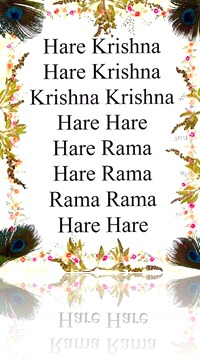 Why is religion the highest benefit to a human birth? This is established from the study of consciousness and its development. We know that in the animal community there is rampant participation in things like eating, sleeping, mating and defending. No one has to teach the dog how to have sexual intercourse, nor does it need to be reminded of the need to eat. A tiger, though not properly versed in economic theory or the current price of gold, can manage to find food for itself, even if the meals don’t come very often. Base behavior is referred to as animalistic because it doesn’t need to be taught. Why is religion the highest benefit to a human birth? This is established from the study of consciousness and its development. We know that in the animal community there is rampant participation in things like eating, sleeping, mating and defending. No one has to teach the dog how to have sexual intercourse, nor does it need to be reminded of the need to eat. A tiger, though not properly versed in economic theory or the current price of gold, can manage to find food for itself, even if the meals don’t come very often. Base behavior is referred to as animalistic because it doesn’t need to be taught.From observing the animals, we see that the human being has a more developed consciousness. This advantage is there for a reason, and it should be used to further a purpose. If an advantage is not used, it ceases being advantageous. If the human being copies the animals in behavior, it has not made the best use of its advanced intelligence. If the human being spends its time only on contemplating what kind of meat it should eat, how to enjoy sex life, and what type of bed to sleep on, how is their mindset any different from the lowly animal? Indeed, the animal has a leg up in this lifestyle because they are free of any hankerings and lamentations. The animal’s consciousness is so undeveloped that it doesn’t even have any shame in its activities, nor does it have to worry about losing everything at the time of death. It doesn’t even know that death is imminent. The regulations provided by scriptures, irrespective of which tradition they come from, are meant to create a level of detachment from the senses. Since the strongest urges relate to eating and sex life, various types of animal sacrifices, accompanied by fasting days and periods of penance, are recommended. To those unfamiliar with the ultimate objective of life and the advantage that an advanced consciousness brings, these restrictions and regulations can be misunderstood. Driven by the urges of the senses, the conditioned living entity will take the animal sacrifices as an open license to eat as much meat as possible and to open slaughterhouses that regularly kill innocent and sweet animals likecows. As previously mentioned, animals already know how to eat meat without being taught, so why would the authors of religious texts waste their time teaching human beings how to do the same thing? Obviously the recommendations for animal sacrifice are meant to curb the tendency towards unnecessary violence; otherwise there would be no purpose to the instruction. The animal has no ability to curb its senses or take to austerity as a means of furthering their condition; only the human being has these abilities. The recommendations for penances and fasts are there to lead the human being to the highest destination. Ironically enough, the concept of tapasya, or austerity, is present in virtually every venture in life. The medical student must undergo years of rigorous training and intense study before they can start to practice medicine. In the absence of this dedication, which most people could not follow, the desired outcome of being a doctor cannot be reached. The austerity measures are not meant as a punishment but rather as a way of increasing the dedication to the task at hand, and thus increasing the chances of meeting the end goal.
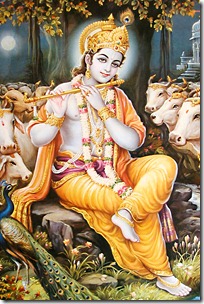 The more advanced the consciousness, the greater the chances of adhering to the regulative principles of religion, which help further the march towards the final destination. The human form of body, especially one possessing the quality of goodness to the highest degree, is considered the greatest boon. The four divisions of social standing instituted by Lord Krishna, the Supreme Personality of Godhead, are built around this principle. This system, which is known as varnashrama-dharma, is commonly misunderstood to be a caste system determined by birth, but it is actually a division based on inherent qualities and the work that goes with them. As the levels in the system are ascended, the chances for achieving liberation increase. The more advanced the consciousness, the greater the chances of adhering to the regulative principles of religion, which help further the march towards the final destination. The human form of body, especially one possessing the quality of goodness to the highest degree, is considered the greatest boon. The four divisions of social standing instituted by Lord Krishna, the Supreme Personality of Godhead, are built around this principle. This system, which is known as varnashrama-dharma, is commonly misunderstood to be a caste system determined by birth, but it is actually a division based on inherent qualities and the work that goes with them. As the levels in the system are ascended, the chances for achieving liberation increase.In virtually every sphere of life we see a caste system. Within a classroom there is a distinction between the teacher and the students, in an airplane there is the pilot and the passengers, and within a nation there is the government and the citizens. All parties are equal constitutionally, but based on training and understanding of information specific to the realm, the parties take on different roles and are thus treated differently. The Vedas, the ancient scriptures of India, consider birth as a male to be more advantageous than birth as a female. On the surface this seems like discrimination, but with an honest assessment, we see that the power of intellect is generally more pronounced in the male, while the power of emotion is predominant in the female. Surely there are exceptions to this rule, but the general tendency is put forth, revealed and worked around to provide society the best opportunity for escaping the clutches of material existence, which continues throughreincarnation, which is fueled by the desire of the spirit soul to enjoy material nature. Within the males, birth and training as a brahmana, a member of the priestly class, is considered the most beneficial, as it leads to the most developed consciousness, one that understands the equality shared amongst all species. Regardless of the specific body type accepted and its composition in terms of the material modes of goodness, passion and ignorance, every form of life is equal at the core. We are all Brahman, aham brahmasmi. This means that we are equally part and parcel of the Supreme Lord, similar to Him in quality and vastly inferior to Him in quantitative powers.
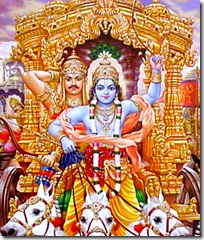 The brahmana, who receives his designation based on his qualities and the work he follows, lives in the mode of goodness. He studies the Vedas, follows their prescriptions and teaches others about the uniqueness of the human birth and the need for following one’s dharma, or occupational duty. Since we are all spirit souls, our eternal engagement is known as devotional service, or bhakti-yoga. Yoga is the linking of the individual soul with the Supreme Soul, the addition of two distinct entities. Through regular adherence to regulations put forth in the Vedas, one can gradually progress towards achieving a permanent union with the Lord in terms of consciousness. At the time of death, the spiritually conscious individual gains release from the cycle of birth and death, and thus frees themselves from all designations pertaining to body and material qualities. The brahmana, who receives his designation based on his qualities and the work he follows, lives in the mode of goodness. He studies the Vedas, follows their prescriptions and teaches others about the uniqueness of the human birth and the need for following one’s dharma, or occupational duty. Since we are all spirit souls, our eternal engagement is known as devotional service, or bhakti-yoga. Yoga is the linking of the individual soul with the Supreme Soul, the addition of two distinct entities. Through regular adherence to regulations put forth in the Vedas, one can gradually progress towards achieving a permanent union with the Lord in terms of consciousness. At the time of death, the spiritually conscious individual gains release from the cycle of birth and death, and thus frees themselves from all designations pertaining to body and material qualities.For those who cannot directly take to bhakti, which is pure devotion to God enacted through a variety of processes, there is the system of varnashrama-dharma, or occupational duty specific to body type. This level of dharma can be compared to the delegation of duties performed by an office manager. On a particular project or within a specific office structure, the leader will delegate specific tasks to different individuals. One person may be charged with sales, while another has to do menial work like cleaning the floors and ensuring that copies are made and sorted. Regardless of the specific task assigned, the end goal is the same, to meet the stated objective of the leader and thus satisfy him. In a similar manner, the brahmana, by judging the qualities of each person, assigns specific tasks, which are delineated in the Vedas, to the members of society. One who performs their duties properly, even if they are unaware of the blissful nature of the Supreme Lord and the need for developing consciousness, will make tremendous progress towards acquiring God consciousness. It is for this reason that there are different dharmas given to men, women, merchants, priests, administrators, warriors and laborers. These designations are not created to punish or to foment dissension through class discrimination, but rather to allow everyone’s natural qualities to be used for furthering the highest cause, that of reaching the supreme destination.
 As Lord Krishna so kindly reveals in the Bhagavad-gita, participation in bhakti and the resulting benefits are open to every single person, regardless of their social stature. As mentioned before, the designations between species and the considerations relating to higher and lower birth are made in terms of consciousness and its potential for development and purification. But these distinctions don’t preclude any person from attaining liberation through dedication to the lotus feet of the Supreme Lord, who is always blissful, knowledgeable and full of form. As Lord Krishna so kindly reveals in the Bhagavad-gita, participation in bhakti and the resulting benefits are open to every single person, regardless of their social stature. As mentioned before, the designations between species and the considerations relating to higher and lower birth are made in terms of consciousness and its potential for development and purification. But these distinctions don’t preclude any person from attaining liberation through dedication to the lotus feet of the Supreme Lord, who is always blissful, knowledgeable and full of form.To prove that His mercy secured through devotion is open to everyone, irrespective of their assigned dharma corresponding to their body type, the Supreme Lord descends to earth every now and then, particularly when there is a sharp decline in religious practice, and grants Hisdarshana, which is the most auspicious vision, to those who are desperately seeking it. During the Treta Yuga, the second time period of creation, God, who is described by thousands of names including the Sanskrit word “Krishna” [which means all-attractive] in the Vedic tradition, roamed the earth as a warrior prince named Rama. Though spending many years in the forest in the garb of an ascetic due to restrictions imposed on Him by His father, Rama was nonetheless the same Supreme Lord, the most fortunate living entity known the world over. Rama was especially dedicated to dharma, or virtue and piety established in the Vedas, but His mercy was still open to everyone, as He was a complete incarnation. 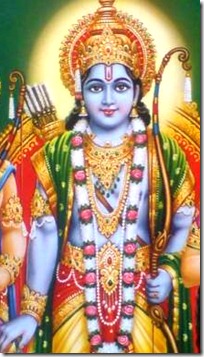 Goswami Tulsidas, a devotee of Lord Rama and a wonderful poet, remarks in the above quoted verse from the Dohavali that Rama granted the most auspicious destination, sugati, to the female ascetic Shabari and the bird Jatayu. Shabari was living in the area of the forest near the Pampa Lake. Lord Rama and His younger brother Lakshmana made their way to her hermitage during their search for Sita Devi, the princess of Videha and wife of Rama. Sita had been taken away by a Rakshasa king named Ravana to an island called Lanka. This was part of the sequence of events necessary for Rama to defeat and kill Ravana in an open battle. The wonderful events of Rama’s life are nicely described in the Ramayana poem penned by Maharishi Valmiki. Valmiki was a contemporary of Rama’s, as the Lord visited the sage’s ashrama during His initial days in the forest. Goswami Tulsidas, a devotee of Lord Rama and a wonderful poet, remarks in the above quoted verse from the Dohavali that Rama granted the most auspicious destination, sugati, to the female ascetic Shabari and the bird Jatayu. Shabari was living in the area of the forest near the Pampa Lake. Lord Rama and His younger brother Lakshmana made their way to her hermitage during their search for Sita Devi, the princess of Videha and wife of Rama. Sita had been taken away by a Rakshasa king named Ravana to an island called Lanka. This was part of the sequence of events necessary for Rama to defeat and kill Ravana in an open battle. The wonderful events of Rama’s life are nicely described in the Ramayana poem penned by Maharishi Valmiki. Valmiki was a contemporary of Rama’s, as the Lord visited the sage’s ashrama during His initial days in the forest.Shabari welcomed Rama and Lakshmana hospitably, feeding them the nicest berries that were in the forest. As a reward for her kind dedication, Rama granted her liberation from the cycle of birth and death, bestowing upon her the fruit of her religious practice. She was dedicated to the instructions offered by her spiritual masters, or gurus, and she always controlled her eating and made sure to live by austerity. An ascetic without penances loses their stature, similar to how a general must have a mission to have his title mean something. Though she was born a woman, which is considered a lower birth due to the lesser potential for the development of consciousness, Rama nevertheless showered His mercy upon her. Shabari was so fortunate that she met Rama directly, proving that God is not the exclusive property of the priestly class or those born into a high family. 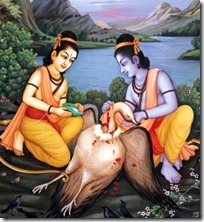 Rama’s benevolence is also open to the animal community, who are considered even lower forms of life than human beings. When Sita was first taken away from the forest through a backhanded plot by Ravana, the demon was met with opposition from the vulture Jatayu. Ravana had an aerial car that he had many years prior taken away from his brother Kuvera. Ravana was using this car to fly back to Lanka with Sita, who was trying her best to escape from the king’s clutches. Had Rama or Lakshmana been around, Ravana would not have been able to escape alive, but because of the distraction created by his Rakshasa friend Maricha, Ravana was able to ascend the car with Sita and fly away in the air. Rama’s benevolence is also open to the animal community, who are considered even lower forms of life than human beings. When Sita was first taken away from the forest through a backhanded plot by Ravana, the demon was met with opposition from the vulture Jatayu. Ravana had an aerial car that he had many years prior taken away from his brother Kuvera. Ravana was using this car to fly back to Lanka with Sita, who was trying her best to escape from the king’s clutches. Had Rama or Lakshmana been around, Ravana would not have been able to escape alive, but because of the distraction created by his Rakshasa friend Maricha, Ravana was able to ascend the car with Sita and fly away in the air.Jatayu was very good friends with Maharaja Dasharatha, Rama’s father. So he immediately put up opposition and valiantly fought with Ravana, trying to save Sita. Unfortunately, Ravana would defeat Jatayu in battle and then fly away. While lying on the ground about to die, Jatayu was visited by Rama and Lakshmana. Though in the form of a lowly vulture, Jatayu was still a pure devotee of God. For this he received the most wonderful benediction, one that hadn’t been received by anyone up until that time: seeing the Lord’s face directly at the time of death. Quitting his body while being held in the arms of the Supreme Lord Rama, Jatayu immediately received liberation. This is the promise made by Krishna Himself in the Bhagavad-gita, that anyone who quits their body remembering Him alone never has to take birth again.
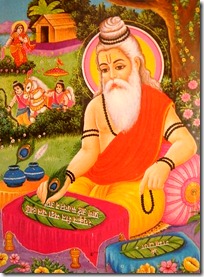 These two events illustrate Rama’s mercy and His ability to grant liberation to anyone, regardless of their social standing. Tulsidas sets the table by referencing these two notable souls, whose stories are difficult to top in brilliance. But then the poet reveals that the holy name, which is glorified in the Vedas, has been known to liberate countless wretched individuals, the worst of the worst. This fact is well established in the Vedas, so one who is familiar with the voluminous literature describing the glories of the Supreme Lord understands that there is no exaggeration in this assertion made by Tulsidas. We know that Valmiki Muni was delivered by the holy name. In his early days he was a violent thief by trade, but through the good graces of Narada Muni, Valmiki took to chanting the name of Rama, albeit indirectly in the beginning, and then subsequently found enlightenment. He gained liberation while in his present body, and he was thus able to author the wonderful Ramayana. These two events illustrate Rama’s mercy and His ability to grant liberation to anyone, regardless of their social standing. Tulsidas sets the table by referencing these two notable souls, whose stories are difficult to top in brilliance. But then the poet reveals that the holy name, which is glorified in the Vedas, has been known to liberate countless wretched individuals, the worst of the worst. This fact is well established in the Vedas, so one who is familiar with the voluminous literature describing the glories of the Supreme Lord understands that there is no exaggeration in this assertion made by Tulsidas. We know that Valmiki Muni was delivered by the holy name. In his early days he was a violent thief by trade, but through the good graces of Narada Muni, Valmiki took to chanting the name of Rama, albeit indirectly in the beginning, and then subsequently found enlightenment. He gained liberation while in his present body, and he was thus able to author the wonderful Ramayana.The deliverance of the brahmana Ajamila is another wonderful example of the power of the holy name. In his youth Ajamila was a dedicated brahmana and devotee of God, but through association with a prostitute he fell down from his high position. Through this woman he begot a son, who was named Narayana due to Ajamila’s God consciousness that still happened to remain. Narayana is another name for Vishnu, or God, which means the source of all men. When he was on his deathbed, Ajamila called out to his son Narayana out of attachment, and because of this he was saved from going to hell. 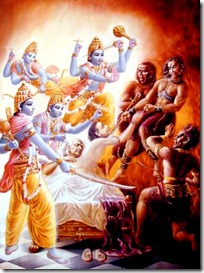 Narayana is the Lord’s name after all, so anyone, even those deserving of punishment due to past sinful activities, who chants it at the time of death cannot possibly be slated to go to the hellish realm. The servants of Vishnu immediately stepped in and declared that Ajamila was a devotee who had chanted the holy name. He was therefore destined for attaining the supreme destination. Narayana is the Lord’s name after all, so anyone, even those deserving of punishment due to past sinful activities, who chants it at the time of death cannot possibly be slated to go to the hellish realm. The servants of Vishnu immediately stepped in and declared that Ajamila was a devotee who had chanted the holy name. He was therefore destined for attaining the supreme destination.These are only two examples out of countless others where the holy name saved even the most wretched person. If the holy name can deliver the sinful, we can just imagine what effect it has on those who are pure at heart and always think of the Lord. In the current age, which is known as Kali for its dark influence on dharma, rare is the person who takes full advantage of the potential for a fully developed consciousness that is exclusive to the human species. The benevolence that is available even to the wretched and low born is extended to every single one of us. We may or may not have the opportunity to see Rama personally like Shabari and Jatayu did, but if we regularly chant, “Hare Krishna Hare Krishna, Krishna Krishna, Hare Hare, Hare Rama Hare Rama, Rama Rama, Hare Hare”, we can be assured of liberation. The Vedas have well established the power and potency of the holy name, so if we hold onto these sound vibrations as our life and soul, the Supreme Person they address will never leave us. |
Search This Blog
Friday, August 26, 2011
The Power of the Holy Name
Subscribe to:
Post Comments (Atom)
No comments:
Post a Comment